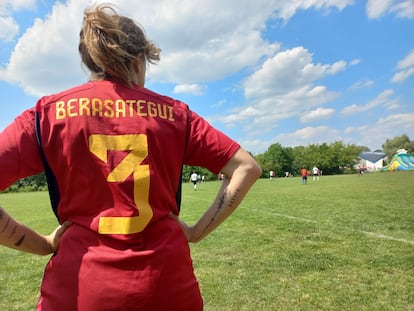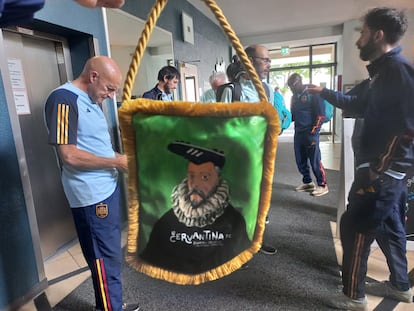The call. The national coach of La Cervantina calls you. You don’t know that there was that selection of Spanish writers who play soccer. He asks you if you would be willing to play in the first Writers’ Euro Cup in Berlin: eight countries with their novelists, poets and essayists fighting on the grass for a drink. Intoxicated by all the sporting epics read and felt, by your collections of old cards and retro national team t-shirts, you say yes. How clear. Which is a dream that one did not expect to live with the scythe of the forties after Christmas. The coach asks you what position you play. You think that the last time you played soccer you were a kid and you were all running all over the field. But you lie and say that you are a midfielder. You try for a laugh. And then you hear the unexpected phrase: “Not to have fun: we are going to win. “Whoever tries a pipe goes to the bench.” You swallow. You hang up the phone. You notice that this is serious. Then four weeks of nerves begin. Worse: scary. An irrational fear.
Players. The selection is book flaps made flesh. The guardian of words Álex Grijelmo is under the gun, with worn SP brand gloves and his 68 tacos only in the DNI. Nacho Carretero, who portrayed the flour, moves between the lines. Gabi Martínez, with a Cruyffista spirit and Delta dreams, attacks from the side. Galder Reguera and Carlos Marañón put their soul and brain into the team. Hopes are placed on Jacinto Elá, born in Equatorial Guinea, who was a youth player for Espanyol, who was the best U-16 in the world and who signed for the Premier before getting injured and ending his career to write it all in Soccer B. Also proud is Olga Capdevila, who publishes her illustrated books in Blackie Books and Fulgencio Pimentel, and who was once the top scorer in her neighborhood league. There is a literary pedigree in Pablo Martín Sánchez, novelist oulipiano and author of the acclaimed book The anarchist who was called like me, that runs the band and narrows spaces. Several poets, such as Pablo García Casado or Carmen Berasategui, change the verses for heels and multi-heel boots. There are more writers selected: Manuel Aguilera, Antonio Pacheco, Alfonso López, Antonio Agredano, Juan López Córcoles, Enrique Criado, Chema Rodríguez, Manuel Marsol, Emili Albi and Alejandro Oliva. He mister is Pedro Zuazua, pure feline instinct and author of A cat does not enter my house. It has a motto: “To win a game, you first have to be tied.”
The alert. A month before the start, they send a training plan. They will be games on a large field, eleven against eleven, and you have to be in shape. Races with changes of pace, continuous jogging, exercise exercises core. What the hell will he be? core. And then, with excitement comes shock. Jorge Bustos, author of that history of homelessness in Madrid that is Almost, who said he preferred La Cervantina to the Cervantes Prize, suffers an injury a week before his debut. He was on a diet. He ran motivated. He tried a party. He tried a Chilean. He broke his elbow. Goodbye to the Euro Cup. Panic spreads. Any discomfort is an alarm. A legion of hypochondriacs. All the fears, the fear.
The equipment. Is it possible to describe the moment of uncovering the bag and finding the official kit? The tracksuit with the shield. The polo with the shield. The shorts with the shield. The shirt—the official shirt of Spain—with the shield and the world champion star. For you. You wear number 4. Koeman’s number 4 at Wembley. Ramos’s 4 in his shot at the Decima. Beckenbauer’s 4 in his first world championship. Nobody looks adult; much less a writer. The happiness.
The prolegomena. You walk together in the national team tracksuit through Berlin. They look at you, you want to be looked at: the ego only changes register. You have made an official visit to the Cervantes Institute. Each one delivers a book of their own to the center’s library. Its director speaks; Nobody thinks about Cervantes. The mind is in La Cervantina. But first there is a chess tournament. At the last minute they invented the chess Euro Cup. Sixteen writers moving the pieces. They target you. It is assumed that someone who has written a book with a chess background will know how to play. Another epic clouds your mind: Arturito Pomar and Bobby Fischer in Stockholm, the crazy genius of Morphy who never wanted to hear the word anymore chess, Alekhine perhaps killed in Estoril. Another deception to the staff: your level is childish. You play against Konstantin Richter, German, author of Kafka was young and needed the money; against Ben Donald, English, author of Spring for Germany; and against Fredeik Ekelund, a Swede, which he wrote together with the renowned Karl Ove Knausgaard Home and Away, a book with thoughts about football. You lose all three games quickly. The European Chess Championship is won by Ekelund. What difference does it make. You didn’t come for that.

The debut Jacinto is a seamstress on Ruda Street in Madrid. He and Bea have hand-made the pennants with the team’s shield: a face of Cervantes with a soccer boot on his head, designed by Manuel Marsol. The captain of Spain hands that pennant to the leader of the English, like in the old days. Berolina Mitte Soccer Club Stadium. Mid afternoon sun. The Alexanderplatz lollipop cuts the sky. The whistle blows. The Eurocup begins. Your nephew asked you which channel the games would be broadcast on; never wake up from being a child. You are on the bench with your fears of immediate injury. The first solo workout – the first of your life in boots – you ended up with a swollen foot and a limp. You finished the second one with pain in your quadriceps. There was no third party just in case.
The attitude. It is inevitable to remember the gag of the Monty Python: a Germany-Greece with two teams of philosophers on the pitch. Hegel, Nietzsche, Heidegger and other frock-clad Teutons playing against Epicurus, Archimedes, Plato and other robed Athenians. They are brooding on the grass, philosophizing, stroking their chins without touching the ball. Nothing to do with the Writers’ Euro Cup. Here you go to death. Insults, tackles, a red card for a German editor, provocations from the Germans to the Spanish bench. Culture has never immunized against barbarism.
The league Against England: Juan López Córcoles, writer from Albacete and podcaster, open the can. One to zero. The coach cries next to the bench. There are a hundred spectators. Five Spaniards cheer on the band. They are the family of Chema Rodríguez, travel writer and filmmaker. They have come on purpose. His father, José María, an 83-year-old Sevilla player, says he was not going to miss his son’s debut with Spain. But the English tied. You have in your left boot a cassocky; The goalkeeper saves the ball and destroys your childhood dreams. You curse. Final whistle. The disappointment is enormous. The doorman Agredano goes sad, alone and guilty to the hotel. At night, at dinner, the football slump reorients the conversations. Carretero talks about how to maintain the depth of characters in fiction. Pablo Martín Sánchez says I do not know what by Umberto Eco. And Galder Reguera raises the issue of copyright. The next day, the chip changes. Football is back. But with a Cervantes accent. Before playing against Austria, each player exchanges a book of their own with their locker room partner. There are motivating phrases: surely more beautiful than in the Champions League locker room. Zuazua’s tactics work: 3-0 victory. And then Bustos arrives with his arm in a cast to play with La Cervantina. Epic. And Germany arrives, the Mannschaft, the bogeyman. The pass is played there. Strain. Grijelmo crashes his head against the post when clearing a ball. He grits his teeth. He suffers. He decides to continue and makes a providential stop. Olga Capdevila plays it. Cashew tempers nerves. Carretero leaves his skin. Jacinto Elá takes three Teutons behind him each time. Gabi Martínez almost broke and arrived with three wounds in her left leg. Chema Rodríguez makes a great use of his 400 gram Espididol to ward off the pain of age. Final: Spain wins 1 to 0, with a rebound goal. And La Cervantina appears on the News. You are on the news as footballers. Euphoria. Music by Raffaella Carrá in the locker room. You are in the semi-finals against France. And yes yes?
The bubble. Literature dislocates you from reality. Other lives, other worlds. It’s Sunday and you wake up in Berlin thinking about the Euro Cup. Your roommate turns on the Spanish radio and they talk about European elections. Suddenly you come into contact with reality in this mix of Erasmus, language exchange and end-of-year trip. You dislike the friction and you leave the room thinking what is more unreal. At the Brandenburg Gate, a group of retired Spaniards shout ‘get them, oe’. They think you are the absolute soccer team. They take pictures with you. The innocence. You experience the dangerous power of a uniform.
The goal. You have built the entire scaffolding of the epic on those moments. Michael Jordan’s last shot in Salt Lake City. The last blow of the Genoese driver. Dertycia’s goal in Tenerife. The diavolo Chiappucci in Sestrière. Nadia Comaneci’s 10th in Montreal. You dreamed it so many times, you imagined it. It’s just a few seconds. A ball reaches the area. You finish with the injured middle thigh. It’s a goal. It’s a goal. You hadn’t played football in twenty years. You have put Spain in the final of the Euro Cup. You run all over the field like Tardelli in the 82 World Cup final. Paradise is feeling hugged by friends.
The reason. Why have we come, to the football fields of Berlin, a hundred writers from Spain, Italy, France, Germany, Poland, Sweden, England and Austria? Miguel Aguilar, editor and president of La Cervantina, responds in one fell swoop.
—At an indefinite moment, around the age of twelve, one loses the ability to play and fantasize about parallel realities in which one is cowboy, firefighter or footballer. La Cervantina allows those dreams to be recovered.
The end. They say that poetry lives in the wound. That without tragedy there is no drama. That defeat creates good stories. They say—above all they say—that great literature can do without endings. Your message is not there. Don Quixote died in bed, although no one remembers that passage: his silhouette with spear, buckler and nag survives. Cervantina, in yesterday’s final in Berlin, died on the shore due to two German goals. However, no one felt defeated yesterday. Nobody believed he was crazy. Whatever they say, they were not mills. They were giants, in one place on the field. Strange fictional dreams.
Subscribe to continue reading
Read without limits
_

